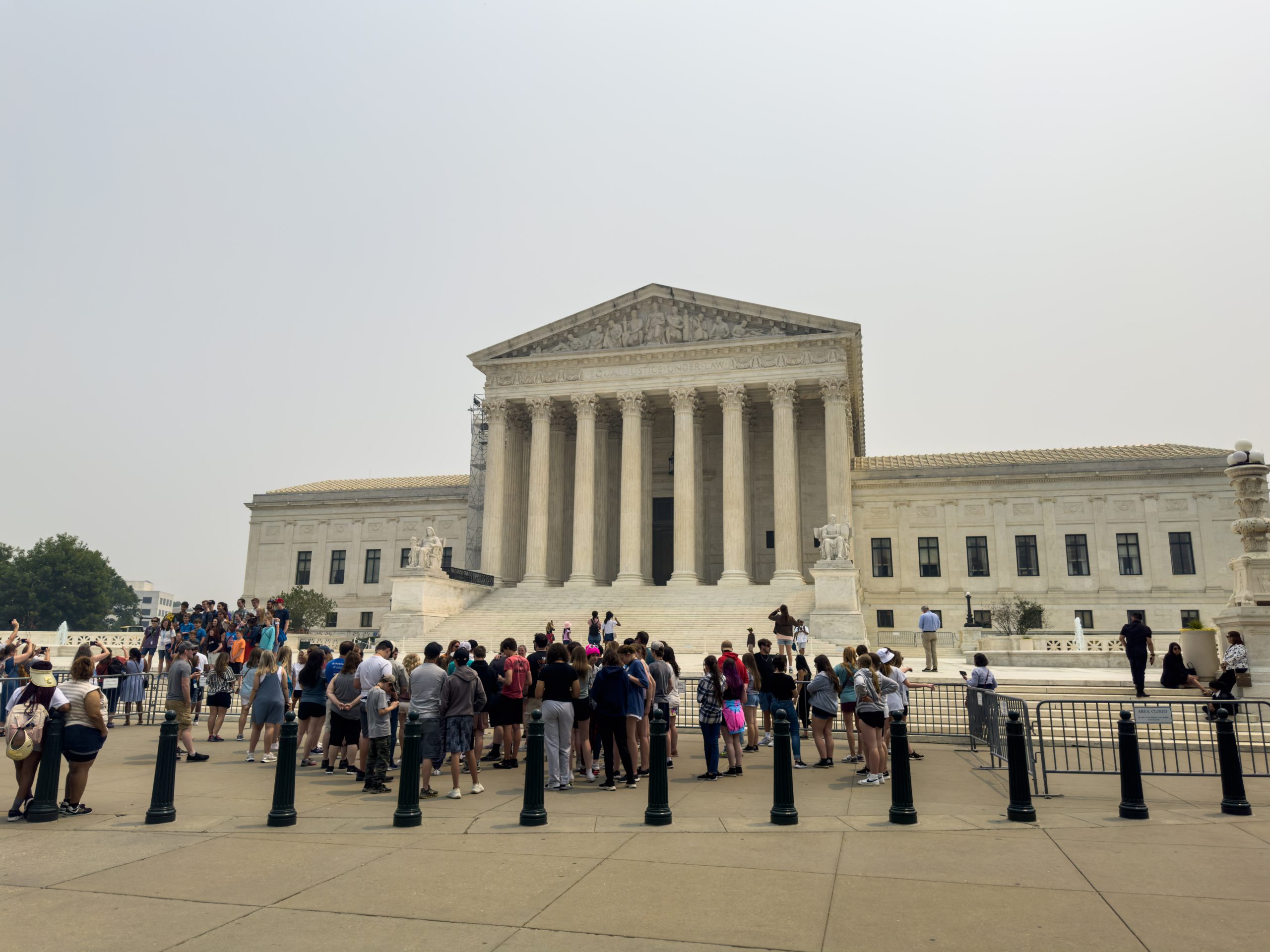
Treppa specifically highlighted the dangers of the long-awaited decision in Haaland v. Brackeen. The outcome will determine whether tribes can protect their youngest citizens through the Indian Child Welfare Act (ICWA), a federal statute that was enacted by the U.S. Congress to stop the removal of Indian children from their communities. The justices of the Supreme Court heard arguments in Brackeen on November 9 — so that’s more than 211 days of waiting on a case that has drawn attention from every corner of Indian Country. Nearly 500 tribes and 50 inter-tribal organizations signed onto briefs, defending the legality of ICWA against an attack from conservative state officials and their non-Indian allies. “That was the biggest effort we have ever done with the Tribal Supreme Court Project,” attorney Melody McCoy, a citizen of the Cherokee Nation who works for the Native American Rights Fund (NARF), said of the united defense of ICWA. Since 1978, tribal governments have relied on ICWA when asserting their sovereignty in child welfare proceedings, from adoptions to foster home placements. But as Treppa pointed out, opponents are attempting to dismantle what is known as the gold standard in child welfare by claiming that ICWA is based on race — instead of the nation-to-nation relationship between tribes and the U.S. that’s been enshrined in federal law and policy for more than two centuries.“It is about disabling tribal sovereignty. It is about redefining us as a race instead of a sovereign government”:@HPULTribe Chair Sherry Treppa on legal attacks on tribal sovereignty. Brackeen attacks Indian Child Welfare Act. Maverick attacks Indian Gaming. #NAFOA2023 @nafoaorg pic.twitter.com/phcxaWlR5f
— indianz.com (@indianz) April 25, 2023
According to Supreme Court precedent, a tribe can be sued when it voluntarily waives its sovereign immunity for certain proceedings. Alternatively, Congress can abrogate tribal sovereign immunity — but such an action must be taken in a “clear” manner. “The Code defines a governmental unit as the United States, a state, commonwealth, district, municipality or foreign state,” attorney Christine Swanick said at NAFOA’s conference on April 24. “It goes on to say in the definition, it’s an instrumentality or department or agency of any of those things. And then at the end of the definition, it says: or other foreign, or domestic government.” “Now, I ask you, I ask the audience, do you see see the word tribe? Do you hear me say tribe in that definition?” Swanick continued. “No,” members of the audience replied. “No, right? No, no,” Swanick affirmed. “Tribe is not in the definition of governmental unit.”“We’re at a real crossroads”: Attorney Riyaz Kanji says U.S. Supreme Court “could go in either direction on tribal sovereignty” in Indian law cases. Panel on "Sovereignty Strategies for the Current Court" comes as Court hears tribal sovereign immunity case. @nafoaorg #NAFOA2023 pic.twitter.com/RHWhbf9Q7a
— indianz.com (@indianz) April 24, 2023
Despite the lack of “clear” action from Congress, the Biden administration is once again going against tribal interests. Even though the federal government is not a party to Lac du Flambeau Band, the Department of Justice went out of its way to submit a brief in the case, arguing that tribal sovereign immunity has been “unequivocally” abrogated by U.S. law. The Biden administration went even further. After claiming to be “committed to a policy of supporting tribal self-government and self-determination,” government attorneys asked for time to argue on April 24 — a request that was granted by the Supreme Court. “This scares me quite a bit,” Kanji said at NAFOA’s meeting. “We are typically in the business of arguing to the court that, yes, tribes are governments, tribes are sovereigns.” But Kanji said that justices who are “more hostile to tribal interests” could undermine the careful positions that Indian Country has advanced in support of their inherent rights. “If they use language that is broad enough, it could actually hurt in other contexts where we’re arguing about tribal sovereignty and governance,” he noted.“We all need to be strategic…If we have a Supreme Court that's not friendly to tribes, that's bad”: Attorney Christine Swanick says decision in tribal sovereign immunity case poses negative impacts across Indian Country. Case being heard at 11am Eastern. @nafoaorg #NAFOA2023 pic.twitter.com/CkfJAlTBnR
— indianz.com (@indianz) April 24, 2023

Cronkite News: Long COVID cases remain high in Arizona
Native America Calling: Eyes in the sky for development, public safety, and recreation
Native America Calling: Three new films offer diverse views of Native life
NAFOA: 5 Things You Need to Know this Week
Chuck Hoskin: Cherokee Nation works toward cure for arthritis
Native America Calling: Protecting young people from the down sides of social media
Cronkite News: Fake ‘shaman’ among candidates failing to make Congressional ballot
Native America Calling: New Native voices in poetry
Cronkite News: Tribes air concerns about border at hearing in nation’s capital
Native America Calling: Indiginerds descend on Oklahoma City
Native America Calling: Political leaders target tribes with unfounded claims
Cronkite News: First Native woman in space shares unique journey
Native America Calling: Tackling a troubling trend for Native women in prison
Chuck Hoskin: Cherokee Nation safeguards our Native language
More Headlines